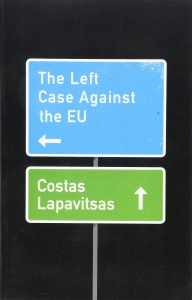In The Left Case Against the EU, Costas Lapavitsas makes the case that the European Union is beyond left-wing reform, as evidenced by the EU’s response to the Eurozone crisis; left-wing contestation must instead be undertaken locally. While more convinced by Lapavitsas’s appraisal of the EU than his proposals for reclaiming the national political space, David Hollanders nonetheless finds this an expedient, informed and lucid analysis.
The Left Case Against the EU. Costas Lapavitsas. Polity. 2018.
Arguably, the Economic and Monetary Union (EMU) showed its true colours in July 2015. In the week before the referendum on the so-called ‘Memorandum of Understanding’ (MoU) between the Troika and the Syriza-led Greek government, the European Central Bank (ECB) refused to supply the liquidity support needed to keep Greek banks afloat. Capital controls followed: Greeks could withdraw a daily maximum of 60 euros. The Greek economy, already weakened by a thousand austerity cuts, came close to a full meltdown. The use of the monopoly of the printing press worked. Although more than 61% of Greek citizens voted ‘Oxi’ on 5 July 2015, rejecting the Troika conditions attached to borrowing to Greece the money it needed to repay its debt to…the Troika and some remaining private lenders. Prime Minister Alexis Tsipras made a U-turn and gave in to all demands, confirming Wolfgang Streeck’s thesis that the ECB is ‘the de facto government of the biggest economy on earth, a government entirely shielded from ‘‘pluralist democracy’’’.
The question of how to respond to a now openly anti-democratic EMU – made possible by the economic constitution that is called the Treaty of Maastricht, which grants the ECB unprecedented powers to close down a country’s banking system in the name of ‘independence’ – can be answered in two ways. Former Greek Minister of Finance and economics professor Yanis Varoufakis has argued for transnational, European cooperation to reform the EU; his political party DIEM25 (Democracy in Europe Movement in 2025), therefore, does not participate in Greek elections, instead running for the European elections. Costas Lapavitsas, former Syriza member of parliament and economics professor as well, takes the exact opposite position. He proposes that the EMU is beyond reform or, to be more precise since the EMU is constantly reformed in a neoliberal direction, the EMU is beyond left-wing reform. Left-wing contestation vis-à-vis international capital, the actor in whose image the EMU is shaped, should therefore be located nationally. This is the main thrust of Lapavitsas’s new book, The Left Case Against the EU, which is an academically informed call-to-arms.
A good part of the book is devoted to motivating the paradoxical stance that international capital should be fought locally. Four elements are key in understanding the political EU architecture from which this position follows. First, according to Lapavitsas, class relations determine the interactions between member states. Second, the author takes the EU to be a hierarchical, treaty-based alliance of nation states; the EU is thus not the superstate some pundits take it for. Third, German hegemony is conditional on the EU. Taken together and fourth, the German establishment can and will block reforms threatening its external surpluses, which underpin its dominant position.
 Image Credit: ‘OXI’ projection on the Ministry of Finance, Berlin, Germany (Fraktion DIE LINKE. im Bundestag CC BY 2.0)
Image Credit: ‘OXI’ projection on the Ministry of Finance, Berlin, Germany (Fraktion DIE LINKE. im Bundestag CC BY 2.0)
The book focuses on the German position, as Germany holds veto powers in Frankfurt and Brussels. The material base of this power is that Germany is a major lender and an industrial exporter. Lapavitsas emphasises that the latter did not result from a German productivity miracle, but has rather been won over the backs of German workers, whose wages have been squeezed since the Gerhard Schröder-led governments (1998-2005) weakened labour’s position in the Hartz reforms. This stimulated exports while suppressing domestic German demand, which was further dampened by weak investments and budget cuts. Germany exported primarily within the Eurozone, at least until 2010. Germany’s current account surplus, then, was and partly remains the mirror image of Greece’s, Spain’s and Italy’s current account deficit. This came to a head with the Eurocrisis, which was essentially a balance of payments crisis. German (and French) banks refused to roll over debt-financed Greek imports. But how to get the money back in the absence of an international bailiff?
Ever since 2010, the E(M)U-bodies have done the private banks’ bidding. They pressured Greece (and Ireland, Italy, Spain and Cyprus) to not default on its debt; instead it had to borrow from public institutions like the European Stability Mechanism (ESM). As these ‘rescue packages’ were used to pay off private foreign creditors and to recapitalise Greek banks, the ESM-cum-Troika acted as the debt collector of finance capital. The Troika, the political muscle of the ESM, uses its state power to force upon borrowing countries ‘conditionalities’, which – at least according to Lapavitsas – reflect power relations among borrowing and lending states. In any case, the Troika meets in secret and does not answer to the European Parliament (or to any other parliament).
As mentioned, one of two left reactions is to try and reform the Eurogroup, the ESM, the ECB, the European Commission and the European Council. This is indeed what DIEM25 aims for. For Lapavitsas, however, to try and reform the EMU towards the left is to ignore what the EMU is: ‘The EU is not a nation state over whose mechanisms the Left could give battle […] It is a transnational juggernaut geared to neoliberal and hierarchal motion’ (122). The German elite will, if it comes to it, rather leave the EMU than hand it over to left parties.
But it won’t come to that, as the ECB has an ultimate weapon, as was made clear in the Greek summer of 2015. The ultimate weapon is the ECB’s monopoly power over liquidity: that is, over the printing press. Any national government that does not bow down to demands of the European Commission or the ECB will see its liquidity evaporate, its banking sector demolished and its economy crippled. The only way, then, for Syriza to have resisted the ECB in 2015 would have been to create national liquidity: that is, to reclaim national monetary sovereignty. This position is in any case consistent with Lapavitsas himself leaving Syriza in 2015. Although Varoufakis also left Syriza in 2015, Lapavitsas criticises him. For while Varoufakis did contemplate establishing a national parallel currency, he did so too little and too late. Lapavitsas points out that Varoufakis in principal honoured the Greek debt, and tried to the very end to come to terms with the Troika, which, as Varoufakis was to find out after more than five months, was not negotiating.
The negative part of Lapavitsas’s account is fully convincing. It has become clear that the EU’s state apparatus acts as the political strongman of private banks who did not accept any loss whatsoever from the lending they entered voluntarily and from which they profited for years. The antidemocratic position of the ECB and the EC, for whom the Greek referendum meant less than nothing, has only been fortified in the last years by fiscal pacts, by the establishment of the ESM, by the mission creep of the Eurogroup and by the monetary programmes of the ECB (Greece is excluded from quantitative easing).
Lapavitsas’s confidence in the possibility of reclaiming the national political space, on the other hand, is less worked out and simply not convincing. It is true that historically (representative) democracy is associated with the nation state, and that national parliaments have better established democratic traditions than the European Parliament. But lest we forget, it was national parliaments that underwrote European treaties, in particular the Treaty of Maastricht. And the French and Dutch parliaments flat-out ignored referenda in which the Treaty of Lisbon was rejected. In any case, it is naive to think that a left parliamentary majority ensures left-wing reforms. But even if a reliable left parliamentary majority can be forged, countries with a current account deficit will keep being dependent on foreign capital. And that, as was clear in the Asia crisis, is the leverage for private creditors and the International Monetary Fund (IMF) to beat a country into submission. It might be more difficult than in the EMU, but a credit crunch followed by bridging loans of the IMF will do the trick.
The conclusion then is that the current financialised, neoliberal, corpocratic conjuncture does not offer a clear route forward for the left. The way out of the impasse will be the new impasse. Unsatisfying as this may be, it is, I feel, the real message of the expedient, informed and lucid analysis of Lapavitsas.
David Hollanders is a lecturer in economics at the department of European Studies, University of Amsterdam.
Note: This review gives the views of the author, and not the position of the LSE Review of Books blog, or of the London School of Economics.


 Find this book:
Find this book: 





2 Comments